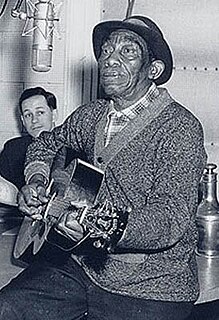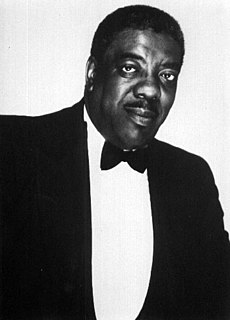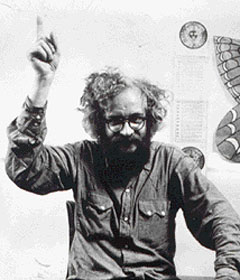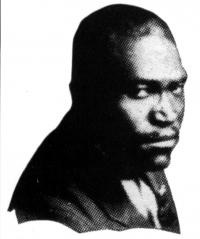Related Research Articles

John Smith Hurt, better known as Mississippi John Hurt, was an American country blues singer and guitarist.

Thomas Andrew Dorsey was an American musician, composer, and Christian evangelist influential in the development of early blues and 20th-century gospel music. He penned 3,000 songs, a third of them gospel, including "Take My Hand, Precious Lord" and "Peace in the Valley". Recordings of these sold millions of copies in both gospel and secular markets in the 20th century.

Alonzo "Lonnie" Johnson was an American blues and jazz singer, guitarist, violinist and songwriter. He was a pioneer of jazz guitar and jazz violin and is recognized as the first to play an electrically amplified violin.

Anthology of American Folk Music is a three-album compilation, released in 1952 by Folkways Records, of eighty-four recordings of American folk, blues and country music made and issued from 1926 to 1933 by a variety of performers. The album was compiled from experimental film maker Harry Smith's own personal collection of 78 rpm records.

Blind Willie Johnson was an American gospel blues singer, guitarist and evangelist. His landmark recordings completed between 1927 and 1930—thirty songs in total—display a combination of powerful "chest voice" singing, slide guitar skills, and originality that has influenced generations of musicians. Even though Johnson's records sold well, as a street performer and preacher, he had little wealth in his lifetime. His life was poorly documented, but over time, music historians such as Samuel Charters have uncovered more about Johnson and his five recording sessions.

James Edward Cleveland was an American gospel singer, musician, and composer. Known as the King of Gospel, Cleveland was a driving force behind the creation of the modern gospel sound by incorporating traditional black gospel, soul, pop, and jazz in arrangements for mass choirs. Throughout his career, Cleveland appeared on hundreds of recordings and earned four Grammy Awards. He was the first gospel musician to earn a star on the Hollywood Walk of Fame. He was inducted into the Gospel Music Hall of Fame in 1984. For his trailblazing accomplishments, he is regarded by many as one of the greatest gospel singers who ever lived. He is best known for his gospel classics "Lord, Help Me to Hold Out", "Peace Be Still", "I Don't Feel No Ways Tired", “Where Is Your Faith", "The Love of God", "God Has Smiled on Me", and his rendition of Gladys Knight & The Pips' "You're the Best Thing That Ever Happened to Me."

Harry Everett Smith was an American polymath, who was credited variously as an artist, experimental filmmaker, bohemian, mystic, record collector, hoarder, student of anthropology and a Neo-Gnostic bishop.
Roots 'N Blues: The Retrospective 1925-1950 is a four-CD box set released on Columbia Records in June 1992. The collection features about five hours of early blues, folk/country and gospel recordings from a variety of American artists. Many of these recordings had never previously been issued in any medium. The liner notes were written by Lawrence Cohn and Pete Welding.
Henry Thomas (1874–1930?) was an American country blues singer, songster and musician. Although his recording career, in the late 1920s, was brief, Thomas influenced performers including Bob Dylan, Taj Mahal, The Lovin' Spoonful, The Grateful Dead, and Canned Heat. Often billed as "Ragtime Texas", Thomas's style is an early example of what later became known as Texas blues guitar.
"Midnight Special" is a traditional folk song thought to have originated among prisoners in the American South. The song refers to the passenger train Midnight Special and its "ever-loving light".

"John the Revelator" is a traditional gospel blues call and response song. Music critic Thomas Ward describes it as "one of the most powerful songs in all of pre-war acoustic music ... [which] has been hugely influential to blues performers". American gospel-blues musician Blind Willie Johnson recorded "John the Revelator" in 1930 and subsequently a variety of artists have recorded their renditions of the song, often with variations in the verses and music.

Reverend J.M. Gates was an American preacher who recorded sermons and gospel songs extensively between the mid-1920s and 1940s. Recording over 200 sides in his career, Gates was one of the most prolific preachers of the pre-war era, and was largely responsible for the popularity in recorded sermons. Among the Reverend's most successful sermons, include "Death's Black Train Is Coming", "I'm Gonna Die with the Staff in My Hand"", and "Death Might Be Your Santa Claus".

The American folk music revival began during the 1940s and peaked in popularity in the mid-1960s. Its roots went earlier, and performers like Josh White, Burl Ives, Woody Guthrie, Lead Belly, Big Bill Broonzy, Billie Holiday, Richard Dyer-Bennet, Oscar Brand, Jean Ritchie, John Jacob Niles, Susan Reed, Paul Robeson, Bessie Smith, Ma Rainey and Cisco Houston had enjoyed a limited general popularity in the 1930s and 1940s. The revival brought forward styles of American folk music that had in earlier times contributed to the development of country and western, blues, jazz, and rock and roll music.

Harry Smith's Anthology of American Folk Music, Volume 4 is a two-disc compilation of twenty-eight American folk recordings originally released on 78 rpm records between 1927 and 1940, issued in May 2000 on Revenant Records, catalogue #211. Compiled by experimental filmmaker and notable eccentric Harry Smith as the fourth album of his Anthology of American Folk Music set from 1952, it was never completed by Smith himself. While the CD is out of print, an LP version has been issued, along with the other three volumes, on the Portland-based Mississippi Records label.
The Rev. Andrew W. Jenkins was a leading composer of American country, folk and gospel songs. He is credited with more than 800 compositions, about a third of which were nonsacred. He and his stepchildren performed as the Jenkins Family, a group considered to be the first family act to record country music, while Jenkins himself was among the most important country composers of the 1920s.

Marie Knight was an American gospel and R&B singer.
Laura Smith was an American classic female blues and country blues singer. Songs she recorded include "Gonna Put You Right in Jail" and her version of "Don't You Leave Me Here". She led Laura Smith and her Wild Cats and also worked with Clarence Williams and Perry Bradford. Details of her life outside the music industry are scanty.

The Country Blues is a seminal album released on Folkways Records in 1959, catalogue RF 1. Compiled from 78 recordings by Samuel Charters, it accompanied his book of the same name to provide examples of the music discussed. Both the book and this compilation were key documents in the American folk music revival of the 1950s and 1960s, and many of its songs would either be incorporated into new compositions by later musicians, or covered outright.

"Leave It There" is a Christian hymn composed in 1916 by African-American Methodist minister Charles A. Tindley. It has become popular enough to have been included in 12 hymnals; and even to be attributed to "traditional" or "anonymous". The title is sometimes given as "Take Your Burden to the Lord and Leave It There" or as "Take Your Burden to the Lord" or as "Take Your Burden", words taken from the song's refrain; the plurals "burdens" and "them" are sometimes used, and "God" instead of "the Lord":
Reverend A. W. Nix was an American preacher who recorded 54 sermons and gospel songs in the late 1920s and early 1930s. He is best remembered for his commercially successful sermon, "Black Diamond Express to Hell." Nix's recordings were reintroduced when he was credited as a major influence on Thomas A. Dorsey, the "father of gospel music." However, the minutes of the 1921 National Baptist Convention confirm that Nix's brother, William Nix, Jr., was actually the influence on Dorsey. Accordingly, nearly all of A.W.'s sermons have been reissued on Document Records and compilation albums.
References
- 1 2 Smith, Harry (2000). "Harry Smith's Anthology of American Folk Music, Vol. 4 (CD booklet)". Revenant Records.
{{cite web}}: Missing or empty|url=(help) - 1 2 "Georgia Peach - Biography". allmusic.com. Retrieved June 29, 2016.
- ↑ Notini, Per (2005). "Lord Let Me Be More Humble in This World (CD booklet)". Gospel Friend.
{{cite web}}: Missing or empty|url=(help) - ↑ Undercurrent: The Hidden Wiring of Modern Music. Bloomsbury. 2002. p. 89. ISBN 9781441109934.
- ↑ "Lord Let Me Be More Humble in This World - Review". allmusic.com. Retrieved June 28, 2016.